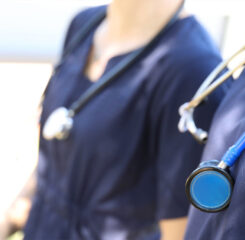Ask the Right Questions During COVID
Economist Milton Friedman once wrote that “only a crisis—real or perceived—produces real change.”
We’re still in the middle of the crisis called COVID. I know you still struggle to meet the unprecedented challenges that this deadly virus throws at you every single day. But even in the midst of our present danger, we can’t lose sight of the future or stop working to make sure this crisis produces real change.
A few months ago, LeadingAge sponsored a virtual visioning workshop designed to give members a chance to step away from COVID for a few hours and ask questions about the long-term futures of their organizations and our field. To be honest, not one workshop participant really stepped away from COVID. We quickly agreed that COVID will define our future, just as it now defines our present.
We used that insight to ponder the many themes that have emerged during this pandemic—themes that every LeadingAge member should be thinking about, and strategizing about, with their boards and management teams. Here are just a few:
The role of community: The importance of community continues to loom large during this pandemic, whether we are lamenting the closure of our buildings to visitors or awed by the teamwork and mutual aid that are helping us get through these dark times. It is now abundantly clear just how much we all rely on our communities, whether those communities include people who live in the same place, do the same work, or share common interests and goals. Communities of all kinds help us do our best work.
So here’s the question:
How can we strengthen our organizations by expanding our view of community? Can we build communities that include people of all generations living inside and outside our walls? Can we create networks with other organizations? Can we reach out to others who share our values?
The role of care: The pandemic has motivated all of us to focus squarely on our health and wellness, favoring prevention over care. This is good news for everyone.
But it raises these questions:
Are our organizations doing enough to help residents, clients, and team members pursue their own wellness? Are we providing support to the whole person? Are we focusing on the health, social, spiritual, emotional, nutrition, and housing needs of all whose lives we touch? Are we designing our policies and practices—and even our buildings—to support those needs?
The role of communication: The pandemic has reinforced how important the public trust is, and how fragile that trust can be in the midst of a crisis. Trust takes years to build and seconds to erode. This year, we increased our communication with a variety of stakeholders—residents, clients, families, regulators, policymakers, and the media, to name a few. We learned that good communication, and the transparency it enables, can help us earn the public trust every single day.
Now, we must ask ourselves:
How can we continue working to strengthen our communications when the current crisis is over? How can we translate the lessons we’ve learned in 2020 into ongoing efforts to communicate—frequently and transparently—with a variety of audiences?
There’s a common theme here, of course: we’ve learned lots of lessons over the past 8 months. Granted, they have been hard lessons. But they are also evergreen lessons that can be applied outside of a crisis, and will surely be relevant long after this pandemic is over.
But first, we need to translate those lessons into better practices, better business models, and better operations for today and for the future. We can do that by being resilient, imaginative, and innovative.
When the coronavirus makes its retreat, our organizations will still be here, still committed to our long-term mission to provide high-quality, holistic, community-building, transparent services and supports to a rapidly growing older population.
In the meantime, we have a critical, short-term mission: to get ready for life after COVID. Asking the right questions now, and imagining a better future to come, may just help us emerge from the pandemic in better shape than we went into it.

Most Recommended
October 15, 2025
 Shutdown Week Three: Impact of Ongoing Closure on Affordable Housing
Shutdown Week Three: Impact of Ongoing Closure on Affordable Housing
February 14, 2026
Fiscal Year (FY) Funding 2026
October 07, 2025
Immigrant Workforce Matching Program Brings Workforce Relief
Recently Added
February 18, 2026
 Colleagues on the Move, February 18, 2026
Colleagues on the Move, February 18, 2026
February 17, 2026
Senators Introduce Nursing Home Staffing Standards Bill
February 14, 2026
DHS Shuts Down: No Other Agencies Impacted
February 13, 2026



